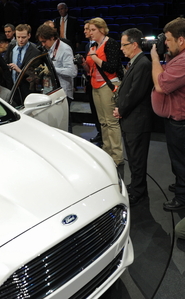Ford 'hits the gas' to roll out five electric cars
 Ford is to invest $135m bringing its battery-testing capabilities in-house, in a bid to boost the development of its new hybrid and electric vehicles by up to 25 per cent.
Ford is to invest $135m bringing its battery-testing capabilities in-house, in a bid to boost the development of its new hybrid and electric vehicles by up to 25 per cent.The Detroit-based automaker is set to launch three electrified vehicles this year, in addition to the Focus Electric and C-Max Hybrid that are already in production.
The C-MAX Energi plug-in hybrid and the Fusion Hybrid will start production this autumn, while the Fusion Energi plug-in hybrid is expected to begin manufacturing by the end of 2012.
The company has until now relied on third-party suppliers to design and test the battery technology that is crucial to the success of hybrid, plug-in hybrid, and pure electric cars.
However, Ford confirmed yesterday it is converting a 285,000-square-foot research and development lab in Dearborn, Michigan, to focus almost entirely on the development of hybrids and electric vehicles (EVs), including battery components.
The company said it will invest $135m in doubling battery-testing capabilities by 2013 to include 160 separate test channels. It added it would now be purchasing machines for testing the power, performance, lifespan, and thermal behaviour of the lithium-ion batteries that power its EVs.
Anand Sankaran, executive technical leader for Ford’s energy storage and high voltage systems division, said moving battery testing capabilities in-house could help to speed up production by 25 per cent.
“Time is of the essence, especially when we have a specific launch date,” he said in a statement, adding that the expanded battery-testing capabilities would enable the company’s EV team to quickly collect, analyse, and apply vast amounts of data. “Projects are completed at least 25 per cent faster than they were with previous-generation hybrids.”
Ford also confirmed it now has more than 1,000 engineers working on vehicle electrification, with 60 engineers added in the last year. It said “dozens more” would be added over the next year as the company seeks to take on established rivals such as Nissan and Toyota, as well as emerging EV providers like Tesla and Fisker Automotive.
In related news, Toyota last week confirmed it would roll out a hydrogen fuel cell powered sedan for the consumer market in 2015.
Jim Lentz, chief executive and president of Toyota sales in the US, told reporters he had been testing a prototype fuel cell Highlander SUV, which could travel up to 320 miles between refuels.
However, he added that the company was still concerned about the lack of available recharging infrastructure for hydrogen vehicles.
You can return to the main Market News page, or press the Back button on your browser.

